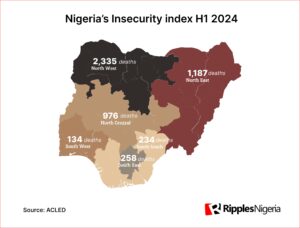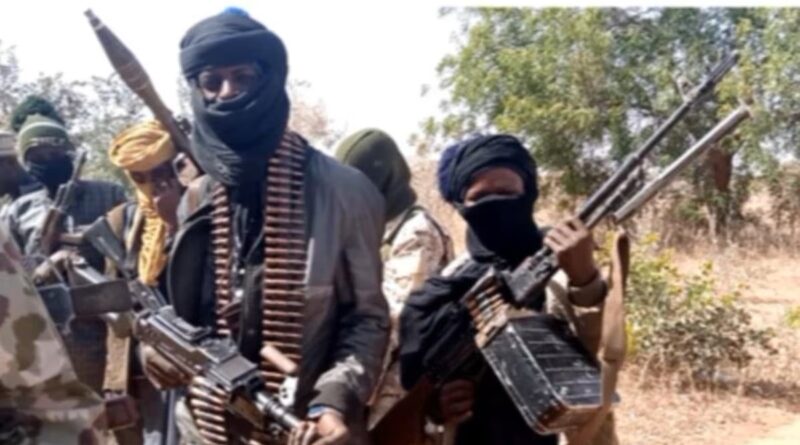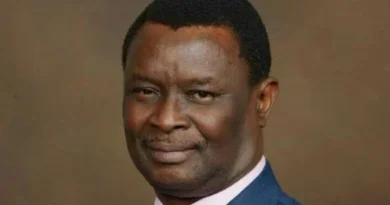A Bleeding Nation: The Security Crisis in Nigeria in 2024
As the curtain closed on 2024, for many Nigerians, it was a desperate struggle to survive, to stay safe, and to hold on to hope. The country’s security landscape presented a devastating spectacle, ensnared in a complex web of internal and external threats that painted a gruesome picture of bloodshed, tears, and fear.
The Nigeria Police Force, being the lead security agency in the country, suffered a devastating blow, with 140 policemen losing their lives in the line of duty in the Federal Capital Territory alone in the year 2024.
The military was not spared, as evident in the ambush on April 19, 2024, where six brave personnel—two officers and four soldiers—lost their lives in Karaga Village, Niger State, as well as other killings witnessed in the North-East, South-East, and South-South regions of the country.
From the rampant banditry, insurgency, kidnapping, and armed robbery that plagued the country to the menacing presence of groups like the Islamic State in West Africa Province, ISWAP, and the new Islamic insurgent group—Lakurawa terrorists in the Northwest; to the ethno-religious conflicts among different ethnic and religious groups, especially in the Middle Belt, which led to localised violence and heightened tension across communities; and in the Niger Delta, where oil theft and related violence affected both local livelihood and national economic stability, the nation’s security agencies faced an uphill battle to keep citizens secure.
Furthermore, the country struggled to contain other critical issues, including the scourge of cultism, the illicit trade in drugs and arms, terrorism financing, money laundering, and the growing menace of cybercrime, particularly among the youth, which posed a significant threat to national stability and security.
Tragic losses
The year was marred by a series of tragic losses of defenceless Nigerians. The rural dwellers in particular lived in perpetual fear as bandits invaded their homes, leaving a trail of death and destruction in their wake. The sound of gunfire became a hauntingly familiar echo through the once-peaceful villages, as families were forced to flee for their lives.
But it’s not just the immediate danger that devastated these communities. The lingering fear of attack also led to a crippling deprivation of their livelihoods. Farmers became too afraid to tend to fields; they abandoned their crops and livestock to wither and die.
The rural economy was slowly being strangled, as the very people who once worked the land with pride and purpose were now forced to cower in fear because their homes and livelihoods came under constant threat from marauding bandits.
In the Southeast
The South East region of the country witnessed a surge in violence perpetrated by separatist groups enforcing sit-at-home orders, which essentially attacked Nigeria’s sovereignty with effrontery and arrant disregard for constituted authority. The alarming situation escalated on November 18, 2024, when unknown gunmen launched simultaneous attacks on Abatete and Ukpo communities in Anambra state, leaving a trail of destruction and death, including three vigilante members and an innocent citizen. These senseless attacks were recurring nightmares that instilled fear and uncertainty among the populace.
In the year under review, another devastating attack in Aba, Abia State, resulted in the loss of 11 lives, including five military personnel and six civilians, with the army blaming the outlawed separatist group, the Indigenous People of Biafra (IPOB) movement, for the incident.
Many civilians, among whom were youths, were alleged to have been killed, harassed, and assaulted by security personnel in a bid to end the reign of the separatist group in the region.

A report by SMB Morgen, an Africa-focused market/security intelligence-gathering firm, revealed that a staggering N419.2 million ransom was paid between July 2023 and June 2024 in the South-East.
This alarming figure accounted for 40% of the total N1.048 billion paid across the six geopolitical zones during the same period, with Anambra State being the hardest hit, as families shelled out N350.2 million in ransom payments, a whopping 88% of the N400 million demanded by kidnappers.
A breakdown of the ransom payments across the Southeast states as revealed by the report showed that Imo State paid N39 million as ransom, Abia State paid N25 million, while Enugu State and Ebonyi State paid significantly lower amounts, with N4 million and N1 million, respectively, as ransom in one year.
But in the regional breakdown of the N2.2 trillion ransom payments made in the same period.
According to another data set from the Nigeria Bureau of Statistics (NBS) in its 2024 Crime Experience and Security Perception Survey, the South-East paid N85.4 billion, an amount lower when compared to N1.2 trillion paid in the North West, which accounted for the highest share.
Kidnapped, murdered
Tragically, many kidnapping victims were brutally murdered despite their families paying ransom. A heartbreaking example was the case of Major General Richard Duru (retd), who was kidnapped in Imo State in September 2024 and had his car stolen. His family paid a ransom of $50,000, but shockingly, he was still killed by his captors, who were later arrested by the Imo State Police Command.
According to the report, out of the 2.2 million Nigerians kidnapped, at least 614,937 lost their lives, representing a fatality rate of 12.8%, while the murder rate was highest in rural areas, with 335,827 incidents, compared to 279,110 in urban areas.
The report also indicated that the North-West recorded the highest number of kidnappings with 1,420,307 cases, followed closely by the North-Central with 317,837 and the South-East with 110,432.
A staggering revelation from the report showed a total of 2.2 million Nigerians fell victim to kidnapping nationwide.
In the African continent, Nigeria was ranked as the second most dangerous country in Africa, after South Africa, with a score of 66.7 points on the Statista Crime Index 2024.
Catholic priest’s woes
The year also witnessed a disturbing trend of kidnappings and killings of Catholic priests, with perpetrators showing no regard for their religious office. Some of the priests kidnapped last year included Father Thomas Oyode, rector of the Immaculate Conception Minor Seminary School, kidnapped on October 27, 2024, and released 11 days later; Reverend Father Christian Uchegbu kidnapped on November 6, 2024; Emmanuel Azubuike, kidnapped on November 5, 2024; Basil Gbuzuo, kidnapped on May 15, 2024; Fathers Kenneth Kanwa and Jude Nwachukwu, kidnapped in February 2024; and Father Christian Ike, kidnapped on June 16, 2024.
Brazen approach to kidnap
The year 2024 was marked by a surge in mass kidnappings across Nigeria, leaving a trail of fear and uncertainty in its wake. One of the most significant incidents occurred on February 1, when a terrorist gang abducted at least 60 wedding guests in the Sabuwa Local Government Area of Katsina State.
This was followed by the outrageous kidnapping of 280 pupils and teachers from Government Secondary School and LEA Primary School in Kuriga, Kaduna State, by bandits on March 7. The same month, terrorists kidnapped 87 people in the Kajuru-Station community, Kaduna State, adding to the growing list of mass kidnappings.
The trend continued throughout the year, with incidents reported in April, May, and June. In May, bandits abducted over 500 persons, killing five in 50 villages in Zamfara State, while also killing four security task force members and three villagers in Niger State. The frequency and scale of these mass kidnappings raised concerns about the government’s ability to protect citizens.
With the country still reeling from these incidents, it’s clear that addressing the root causes of these kidnappings and ensuring the safety of all Nigerians will be a top priority this year.
Cybercrime
Cybercrime also posed a significant security challenge in Nigeria in 2024, with the country’s increasing reliance on digital technologies creating vulnerabilities that were exploited by cybercriminals. The threat landscape was characterised by a rise in sophisticated attacks, including phishing, ransomware, and business email compromise, which resulted in substantial financial losses for individuals, businesses, and government institutions.
The Nigeria Police Force National Cybercrime Centre, NPF-NCCC, recovered N8.8 billion and $199,238 fraudulently syphoned from victims last year, with over 751 individuals arrested and prosecuted for their involvement in cybercrime.
Furthermore, the unit also recovered 685 devices used in these illicit activities. They included mobile phones, laptops, computers, routers, servers, drones, and Starlink devices while 16 houses and 39 plots of land were confiscated.
The Economic and Financial Crimes Commission, EFCC, raised an alarm on the escalating threat of cybercrime in Nigeria, revealing a staggering loss of over $500 million to cyberattacks annually and rated it as the third-largest GDP in the world, with 2,328 cases reported daily.
Also, a survey by the Nigerian Communications Commission (NCC) revealed alarming statistics on the prevalence of cybercrime in Nigeria, with over 90% of businesses falling victim to cyberattacks, incurring average losses exceeding N10 million.
Onslaught on bandits, criminals
Despite the daunting security challenges last year, security agencies made significant strides in keeping the situation under control. The military, in particular, achieved notable successes in neutralising leaders of various bandit groups. Among those killed were Halilu Sububu, Buhari Alhaji Halidu (also known as “Buharin Yadi”), and Boderi Isyaku, a notorious bandit leader responsible for the kidnapping of 39 students and the attack on the Nigerian Defence Academy, NDA, in 2021.
Other notable bandit leaders who met their demise last year were Dogo Gudali, Dogo Rabe, Alhaji Auta, Kachalla Ruga, Rufai Maikaji, Ya’u, Alhaji Karki, and bandit leader “Yellow.”.
The Nigerian Air Force played an important role in the fight against banditry and insurgency and recorded significant milestones in its operational efforts.
According to reports, the Air Force successfully flew over 1,040 missions in 1,080 sorties, accumulating an impressive 2,300 flying hours. These extensive operations had a profound impact on the operational environment, significantly weakening the adversary’s resolve and will to fight.
On the part of the police, the year under review witnessed a significant number of reported cases across police commands. In the FCT alone, 1,426 cases were reported, resulting in the arrest of 1,077 suspects.
Armed robbery topped the list with 268 reported cases, leading to the arrest of 132 suspects. This was closely followed by “one-chance” robbery, with 263 reported cases and 71 suspects arrested. Kidnapping ranked third, with 104 reported cases and 216 suspects arrested. Homicide cases were also significant, with 68 reported cases and 78 suspects arrested, while 32 cases of cybercrime were reported, resulting in the arrest of 15 suspects.
Additional reported cases in the FCT included burglary, with 73 cases and 20 suspects arrested; fraud, with 385 reported cases, resulting in the arrest of 422 suspects; and cultism, with 38 reported cases and 59 suspects arrested.
The FCT Command also made substantial recoveries, including 376 firearms, 13 AK-47 magazines, and 187 rounds of live ammunition.
Furthermore, a total of N409,992,000 was recovered from various crime cases, such as kidnapping, armed robbery, burglary, and fraud. Additionally, 99 vehicles were recovered from car theft, “one-chance” robbery, and cultism cases.
These efforts contributed to a 15.1% reduction in crime incidents within the FCT between 2023 and 2024, according to the Command.
Projection into 2025
The neutralisation of high-profile targets and arrests made by the military and police were anticipated to significantly cripple operational capabilities of criminal groups, ultimately paving the way for a safer Nigeria. However, this expectation was not met.
Contrary to predictions, bandits persisted in their kidnapping and killing sprees, seamlessly filling the power vacuum left by their eliminated leaders.
Just six days into 2025, tragedy struck in the Kuchibiyu Community, Bwari Area Council, Abuja, when a suspected bomb explosion ripped through an Islamiyyah school, claiming the life of one student and injuring four others.
As Nigeria enters 2025, it is evident that the nation’s security landscape demands innovative strategies to combat emerging threats. Despite the reaffirmation of the Chief of Defence Staff, General Christopher Musa, to strengthen security across Nigeria in 2025, pundits are still of the view that this year may witness heightened tension.
For Executive Director of Rule of Law and Accountability Centre, RULAAC, Mr. Okechukwu Nwagunma, said, “Nigeria’s security landscape is poised to be shaped by several key trends. Ongoing security threats will continue to plague the nation, with Boko Haram and ISWAP maintaining their operational capabilities, despite potential setbacks from government offensives.
“In response to rising threats, community policing is likely to become more fragmented, with communities resorting to self-defence mechanisms and traditional policing. This shift may lead to a more complex security environment.
“However, there are opportunities for progress. A focus on socio-economic drivers may lead to more comprehensive strategies addressing root causes like poverty and unemployment, ultimately promoting long-term stability. International collaboration could also enhance intelligence-sharing and security capacity among Nigerian forces.
“Again, new challenges will emerge, including the rise of new threats from cyber-attacks and urban crime, requiring updated strategies and resource allocation for law enforcement. Intensified government operations in the Southeast may also exacerbate conflicts and human rights concerns.
Recognition of the importance of dialogue and community engagement will be crucial to addressing these challenges. Initiatives focused on community policing, empowerment, and dialogue can help rebuild trust in law enforcement and foster local efforts to combat crime. A comprehensive approach combining dialogue, socio-economic initiatives, and strategic law enforcement is necessary to address the underlying causes of instability and violence in Nigeria,” Nwagunma said.
Human rights activist Emmanuel Ikule lamented the government’s failure to tackle thuggery, banditry, kidnapping, and terrorism, describing it as a significant factor enabling these crimes.
On his part, security analyst Frank Oshanugor observed that women had become primary targets for kidnappers due to their perceived vulnerability and the emotional response they elicit, which often results in quicker ransom payments. He therefore called for a mechanism to be in place to reduce kidnapping in 2025.
Corroborating his observation on women as targets of kidnappers, legal practitioner Oluwatoyin Ndidi Taiwo-Ojo warned of the social and economic repercussions of the upsurge in female kidnappings, including restricted movement, reduced participation in education, and declining economic empowerment for women.
Recommendations
To strengthen security and law enforcement in Nigeria by 2025 and curb insecurity, Programme Officer, Network on Police Reform in Nigeria, NOPRIN Precious Osinaku, proposed strengthening internal accountability mechanisms within the Nigeria Police.
“This can be achieved by expanding the operational reach and capacity of the NPF Complaint Response Unit (CRU). The CRU’s statutory framework should be reviewed to guarantee its independence, and a senior police officer with a rank not below the Chief Superintendent of Police should head the unit.
“Additionally, public awareness and engagement should be strengthened through continuous awareness campaigns, partnerships with civil society organisations (CSOs), and community leaders. The CRU should also expand its partnerships and resources by engaging with private sector entities to provide resources, technological support, and funding. Furthermore, the oversight and accountability of police detention facilities in Nigeria should be strengthened. This can be achieved by ensuring compliance with the provisions of the Police Act, initiating training for divisional police officers, and directing public enlightenment campaigns on complaints mechanisms available to arrested and detained persons.”
Expectations
This year, the Nigerian people demand more than just promises; they demand action. The Chief of Defence Staff, General Christopher Musa; Inspector General of Police, Kayode Egbetokun; and the entire security apparatus must walk the talk by translating assurances into tangible results.
The nation’s patience has worn thin; the time for rhetoric is over. It is now time for decisive action, commitment, and an unrelenting drive to restore peace, stability, and security to every corner of Nigeria. Will 2025 be the year of transformation or another missed opportunity? The choice is clear, and the responsibility lies squarely on the shoulders of Nigeria’s leaders and security agencies.
See Also: Emefiele and Co-Defendant to Resume Trial for $4.5bn Fraud
Content Credit| https://www.vanguardngr.com/
Picture Credit | https://www.ripplesnigeria.com/




